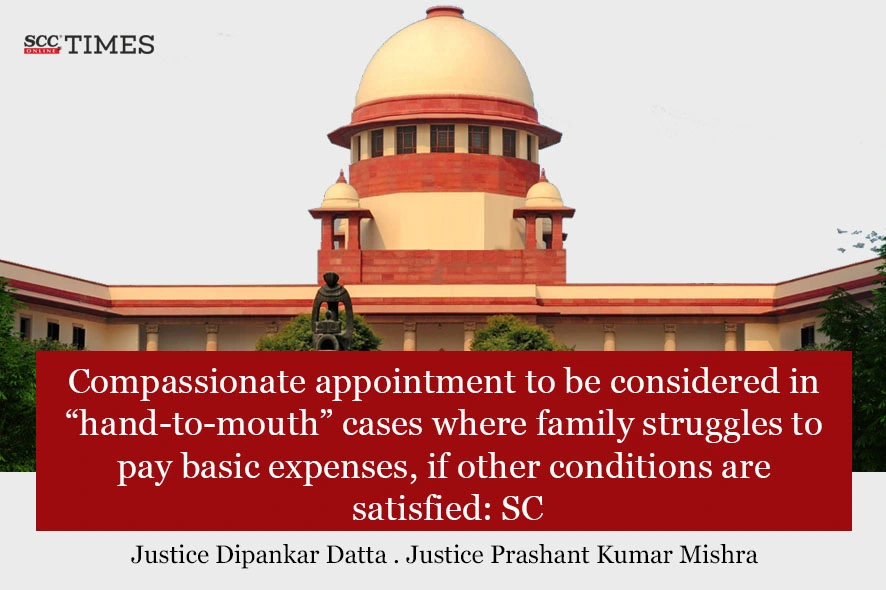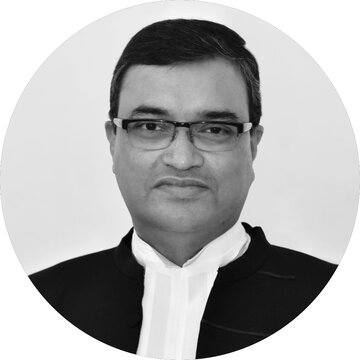Supreme Court: In a civil appeal against Kerala High Court’s decision dismissing an intra-court appeal preferred by the Canara Bank and upheld the Single Judge’s decision for appointment under the scheme of 1993 in the sub-staff cadre within two months, the Division Bench of Dipankar Datta* and Prashant Kumar Mishra, JJ. allowed the appeal and set aside the impugned decisions. However, in the interest of justice, the Court directed for payment of Rs. 2.5 lakhs to the respondent.
Factual Matrix
The father of the respondent passed away on 20-12-2001 while in service of the appellant- Canara Bank (‘Bank’). He had four months of service left prior to superannuation. A scheme of 1993 for appointment on compassionate grounds formulated by the Bank was in force when the respondent’s father passed away. Within a month of his father’s death, the respondent applied for appointment on compassionate ground. The respondent’s plea was rejected by the Deputy General Manager of the Bank on grounds that the respondent’s mother was in receipt of family pension of Rs. 4367 and hence the financial position of the family did not warrant an appointment on compassionate grounds; and the respondent was overaged for the post of ‘Prob. Peon’. As per the scheme of 1993, the maximum age limit for appointment to a clerical post as well as in the sub-staff category was 26 (twenty-six) years. The scheme, however, provided for relaxation of the upper age limit up to a maximum limit of five years. The respondent’s case was that, though over-aged by a few months, the same was not considered by the Bank for such relaxation.
During the pendency of the writ petition, the Bank issued Circular No. 35/2005 dated 14-02-2005 (Scheme of 2005) introducing the “Scheme for payment of lumpsum ex-gratia amount in lieu of employment on compassionate grounds”. This scheme discontinued the compassionate appointment under the scheme of 1993.
The Single Bench of the High Court allowed the respondent’s petition. The order passed by the Deputy General Manager refusing the respondent appointment on compassionate grounds was held to be not in accordance with the scheme of 1993. In furtherance of the said judgment and order, the Bank re-examined the claim for compassionate appointment and once again declined the claim. The respondent approached the High Court again. The High Court allowed the appeal and directed for appointment under the scheme of 1993 in the sub-staff cadre within two months. It was also directed that the Bank shall, in addition, pay a sum of Rs. 5 lakhs to the respondent as compensation for the reluctance shown in giving a compassionate appointment in time.
In the intra-court appeal by the Bank, the Division Bench of the High Court dismissed the appeal with exemplary cost of Rs. 5 lakhs, in addition to the compensation directed to be paid by the Single Judge.
Grey Area- Whether the rule/policy/scheme prevailing on the date of death, or the date of consideration of the application is applicable forty-four years of age.
The Court also identified that the question as to which rule/policy/scheme would be applicable for consideration of an application for compassionate appointment, i.e., the rule/policy/scheme prevailing on the date of death, or the date of consideration of the application has been a grey area for long and divergent views have been taken by the coordinate benches of the Court.
The Court referred to a trajectory of authorities wherein the Court has discussed this question. In Abhishek Kumar v. State of Haryana (2006) 12 SCC 44, it was held that since the appellant had sought for appointment on compassionate grounds at a point of time when the 2003 Rules were not in existence, therefore, his case was required to be considered in terms of the Rules which were in existence in the year 2001. In Canara Bank v. M Mahesh Kumar, (2015) 7 SCC 412 it was held that claim for compassionate appointment under a scheme of a particular year cannot be decided based on a subsequent scheme that came into force much after the claim.
The Court pointed out that N.C. Santhosh v. State of Karnataka, (2020) 7 SCC 617, does seem to have impliedly overruled Canara Bank (supra) by holding that the norms, prevailing on the date of consideration of the application should be the basis for consideration and not the norms as applicable on the date of death. The Court also noted that after N.C. Santosh (supra), State of Madhya Pradesh v. Amit Shrivas (2020) 10 SCC 496 was pronounced holding that compassionate appointment has to be in terms of the applicable policy as existing on the date of demise, unless a subsequent policy is made applicable retrospectively.
Analysis and Decision
Whether the Division Bench of the High Court was unjustified in not allowing the intra-court appeal of the Bank and in upholding the judgment of the Single Judge while directing the respondent’s appointment at a point of time when he was past
The Court perused the Scheme of 1993 and noted the age norms to be as follows:
a. In case of widow/widower
Minimum — 18 years
Maximum — No specific upper age limit but shall be below the age of superannuation.
b. In case of others
Minimum — 18 years
Maximum — 26 years for both Clerical post and Sub-staff category.
The Court also noted that- where no dependent of the deceased employee within the prescribed age limit is available for employment, the Bank may at its discretion relax the upper age limit upto a maximum limit of 5 years.
The Court reiterated the principles settled by the Court on the contours of appointment on compassionate grounds.
The Court noted that the respondent’s father passed away in December 2001 and said that the respondent was pursuing his claim diligently since then. Hence, irrespective of how old the respondent is presently, his age cannot be determinative for foreclosing his claim and bar a consideration of the same on merits.
“The underlying idea behind compassionate appointment in death-in-harness cases appears to be that the premature and unexpected passing away of the employee, who was the only bread earner for the family, leaves the family members in such penurious condition that but for an appointment on compassionate ground, they may not survive.”
The Court stated that there cannot be a straitjacket formula applicable uniformly to all cases of employees dying-in-harness which would warrant appointment on compassionate grounds. Each case has its own peculiar features and is required to be dealt with bearing in mind the financial condition of the family. Further, the Court added that it is only in “hand-to-mouth” cases that a claim for compassionate appointment ought to be considered and granted, if at all other conditions are satisfied. Such “hand-to-mouth” cases would include cases where the family of the deceased is ‘below poverty line’ and struggling to pay basic expenses such as food, rent, utilities, etc., arising out of lack of any steady source of sustenance. This has to be distinguished from a mere fall in standard of life arising out of the death of the bread earner.
Regarding the issue that whether there was proper and reasonable assessment of the financial condition of the family consequent upon death of the respondent’s father, the Court perused the Bank’s order to understand their financial situation. The Court noted the deceased left behind him his widow, the respondent and three daughters as his surviving heirs. All the daughters were married and settled. Only his spouse and son were dependants. The respondent and his mother were residing in their own house. That apart, the Court also pointed out that the deceased was four months away from retirement on superannuation.
The Court said that if, the respondent’s father would have received a pension amount of Rs. 6398/- and burdened to feed himself as well as his two dependants, viz. his spouse/ respondent and son, the amount of family pension initially sanctioned, i.e., Rs. 4637 by any stretch of imagination was insufficient or inadequate for feeding two mouths. Thus, the Court said that the matter at hand was not such where the death of the respondent’s father brought about such dire consequence and/or disastrous outcome that the respondent and his mother would have to cope with miserable effects which, could be remedied only by offering an appointment on compassionate ground.
While interpreting the Scheme of 1993, the Court agreed with the submission of the Bank’s counsel that the question of relaxation in age criteria would arise only when the claimant satisfies the other requirements of the Scheme of 1993 for compassionate appointment. The Court observed that, “relaxation of age is a step to be taken in the final stages of the entire process and it would arise for consideration provided all other conditions for appointment are satisfied.”
Relying on Union of India v. B. Kishore, (2011) 13 SCC 131, the Court reiterated that indigence of the dependents of the deceased employee is the fundamental condition to be satisfied under any scheme for appointment on compassionate ground and that if such indigence is not proved, grant of relief in furtherance of protective discrimination would result in a sort of reservation for the dependents of the employee dying-in-harness, thereby directly conflicting with the ideal of equality guaranteed under Articles 14 and 16 of the Constitution.
Hence, the Court held that the order of the Bank denying compassionate appointment was unexceptionable and, therefore, not liable to any interference in the exercise of writ jurisdiction.
Further, regarding the reliance by the High Court on Canara Bank (supra), the Court held that the Division Bench was not at fault. However, the Court held that the Division Bench ought not to have overlooked the criterion relating to suitability while directing appointment of the respondent straightaway. Thus, the Court agreed with the Bank’s submission that the question of suitability was left untouched by Canara Bank (supra) and the appellant ought not to have been made to suffer an order on its appeal having more adverse consequences than the order on the writ petition.
In the interest of justice, the Court directed to make a lumpsum payment of Rs.2.5 lakh to the respondent within a period of two months from date and the proceedings be closed.
CASE DETAILS
|
Citation: Appellants : Respondents : |
Advocates who appeared in this case For Petitioner(s): For Respondent(s): |
CORAM :









